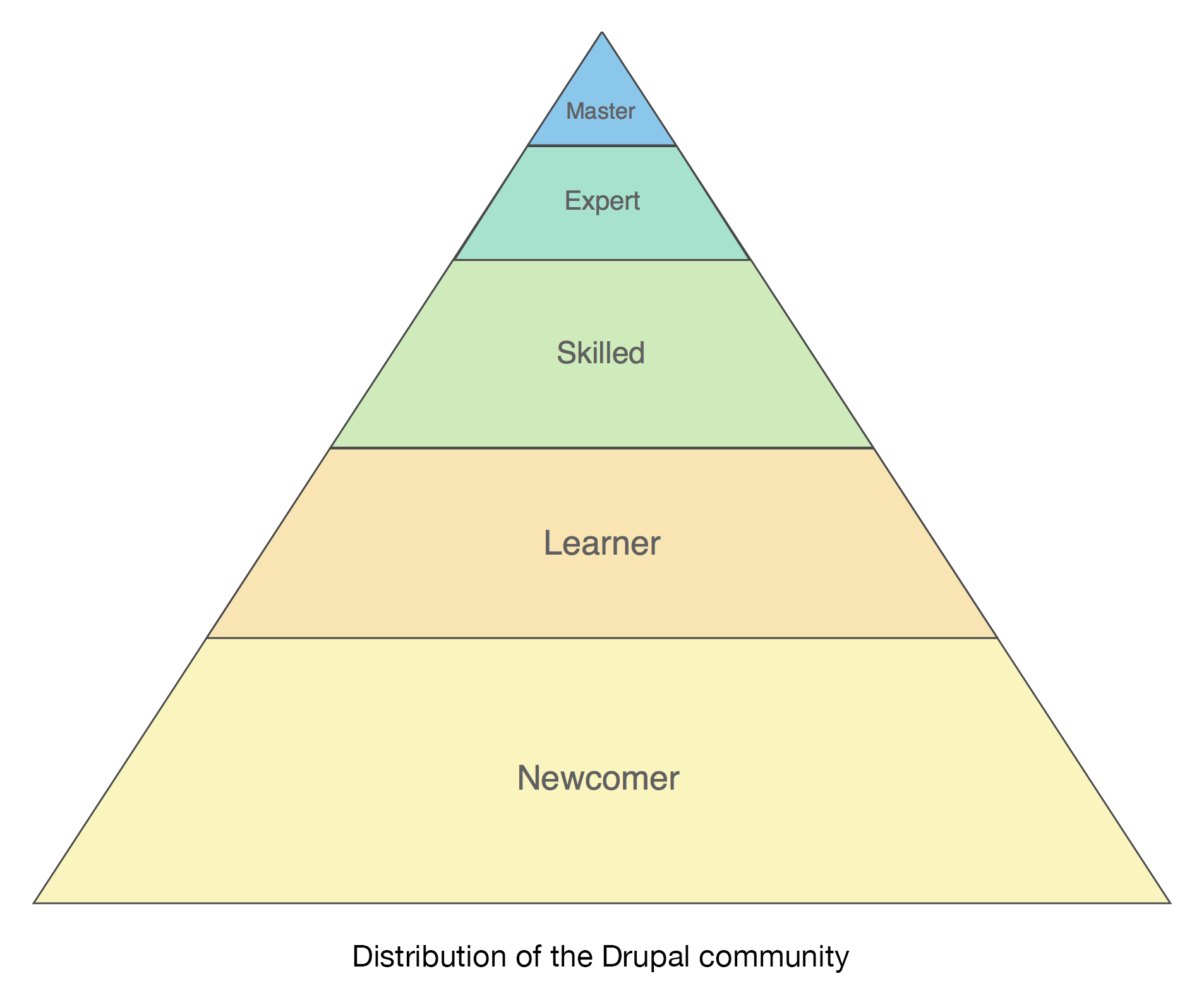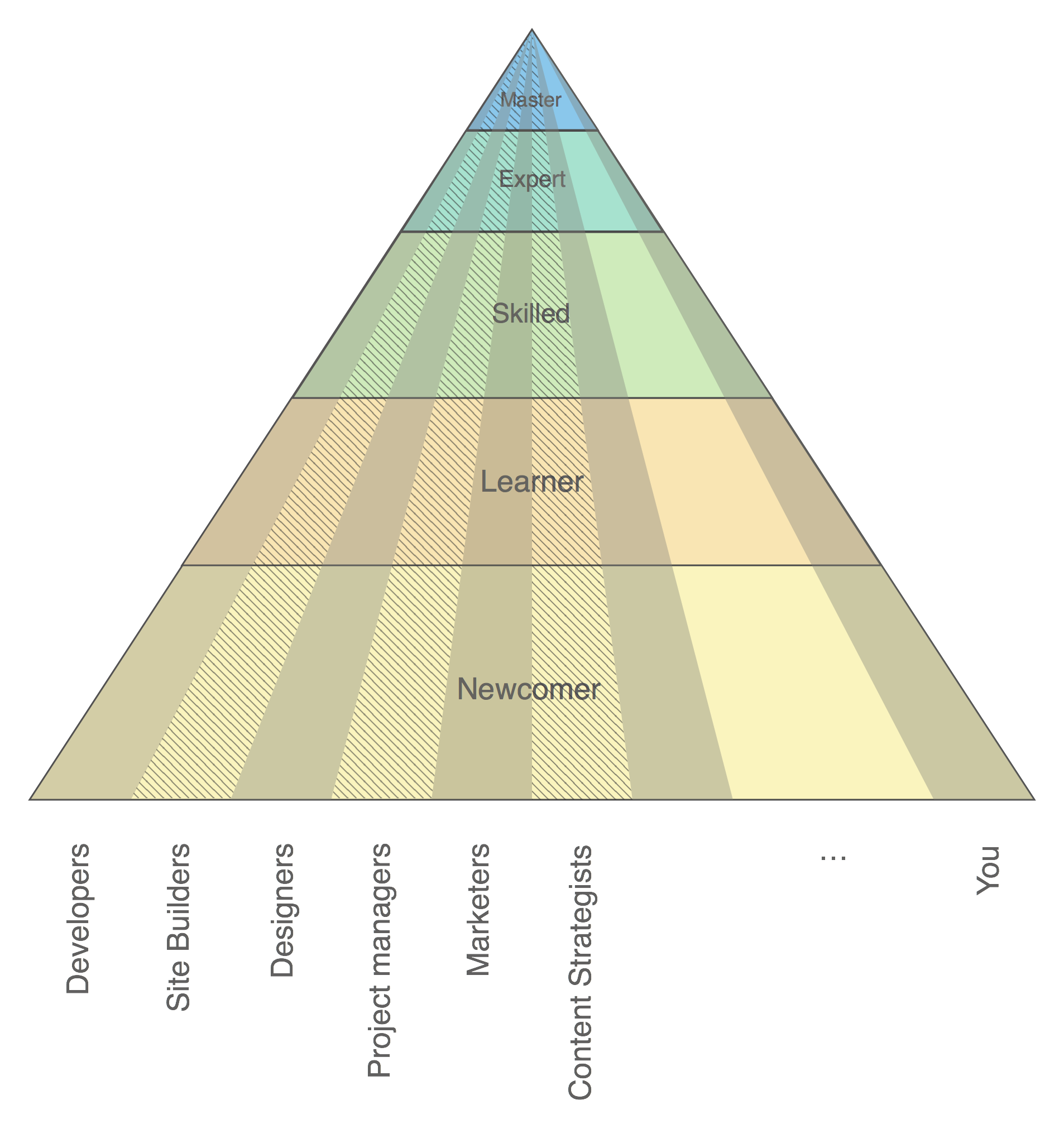 Support for Drupal 7 is ending on 5 January 2025—it’s time to migrate to Drupal 10! Learn about the many benefits of Drupal 10 and find migration tools in our resource center.
Support for Drupal 7 is ending on 5 January 2025—it’s time to migrate to Drupal 10! Learn about the many benefits of Drupal 10 and find migration tools in our resource center.Get the full Drupal.org User Personas report:
This area of the site provides information about Drupal.org itself and its infrastructure. For information about Drupal, the software, see About Drupal, Documentation, Get Started.
Personas are composite characters. They represent people—the goals they have, and the things they do—in key Drupal.org audience segments. A persona is not a single person. It’s a blend of behavioral information gathered by research. That information guides decisions about how and what to write, design, and build for people who use Drupal.org.
In the summer of 2014, with the help of Whitney Hess, the Drupal Association performed user research and developed Drupal.org personas. The results were published in September 2014. An additional series of posts introducing even more detail came later.
The Drupal.org user personas are based on levels of skill and familiarity with the Drupal ecosystem. They represent the kinds of people most likely to use Drupal.org and make lasting contributions to Drupal. They don’t capture every conceivable type of person who might visit Drupal.org. And they don’t account for every possible interaction with Drupal.org. The personas are about the people and interactions research suggests can have the biggest impact on the future of Drupal.
Drupal needs your skills. Yes, yours.
Drupal is both a project and a community. It’s made and improved by people with all kinds of abilities and backgrounds from all over the world. And it’s used by people around the world to power all kinds of websites. Drupal thrives on this diversity of people and skills.
The skills people have and the journeys they go through from the moment they discover the Drupal community until they are active contributors are unique. However, most of their journeys share some similarities. These similarities are represented in Drupal.org user personas.
Drupal.org personas are based on a modified version of Dreyfus's model of skill acquisition. Our model suggests that along their journeys, every member of the Drupal community can find themselves at one of five stages, based on how familiar they are with Drupal ecosystem—the software, the community, its processes, and how actively they participate and contribute:

- Newcomer
- Learner
- Skilled
- Expert
- Master

Newcomer
Has heard about Drupal, but has a limited understanding of the software and ecosystem/community around it. Has never built or worked on a Drupal website, attended any Drupal events, or contributed to the project in any way, likely has never visited Drupal.org before.
Learner
Has a general understanding of what Drupal is and has applied that understanding somehow. Can at least explain what Drupal is and answer some questions about how it can be used. May even know how to build, administer, or theme a simple Drupal website, but works with Drupal only occasionally. Doesn’t have a deep understanding of the ecosystem around Drupal, though, and has only had limited interactions with the Drupal community. Understands general web concepts, but is still getting familiar with Drupal-specific terminology.
Take a look at the Learner persona.
Skilled
Has a moderate understanding of what Drupal is and how its ecosystem works. Is fluent in Drupal-specific terminology. Knows how to build, theme, or configure a relatively complicated Drupal site by leveraging Drupal’s ecosystem of contributed projects (modules and themes) or service providers. Occasionally mentors Newcomers. Able to identify and report bugs. Has spent a decent amount of time working with Drupal. Is lightly engaged with the community (primarily takes part in issue queue discussions), often is engaged indirectly via some sort of liaison.
Take a look at the Skilled persona.
Expert
Exhibits a deep understanding of Drupal and the Drupal ecosystem. Has probably been working with Drupal for at least a couple of years. Can give a detailed explanation of major Drupal concepts, what they are, and how they work. Very familiar with the people and process aspects of the Drupal ecosystem, such as whom is known for what areas of expertise, and how to get answers to questions and resolutions of issues more quickly than most. Actively contributes to Drupal and its community in a variety of ways. Has a demonstrated track record of contributions. May have helped build, configured, or themed advanced websites with Drupal. Mentors Newcomers, Learners, and Skilled community members. Has likely attended more than one Drupal event, both local and international. May have sponsored a few of them. May hold an appointed or elected leadership position in the community.
Take a look at the Expert.
Master
Demonstrates an excellent understanding of Drupal project and the Drupal ecosystem. Has probably been an active member of the community for at least several years. May hold one or more appointed or elected leadership positions. Has an extensive track record of contributions, and is a well-known person in the community. Worked on (designed, helped build, configured, or themed) Drupal websites of great complexity. Can explain the rationale behind major Drupal concepts with a sense of historical perspective about the project and the community. Is immersed in the community, capable of mentoring even Experts, and often collaborating with other community leaders on Drupal-strengthening initiatives and programs.
Persona-driven content, design, and functionality
To help focus efforts on the content and functionality that will have the most impact, the Drupal Association categorized the personas. Primary personas are the people Drupal.org’s content, design, and functionality should serve first. Secondary and tertiary personas have unique needs we must not ignore. But research suggests that satisfying the primary personas first will largely address additional needs too.
Based on information gathered in user interviews, Learner and Skilled are the primary personas. Expert is the secondary persona. Newcomer and Master are tertiary personas.
The central focus of upcoming Drupal.org improvements will be the transition from Learner to Skilled. Improving from Learner to Skilled has proven much more challenging for people than moving from Newcomer to Learner, and is often where Drupal adoption stalls as people feel lost. By helping people transition from Learner to Skilled, we create more engaged community members and grow Drupal adoption, thus following the two primary objectives of the Drupal Association.
The secondary focus is the transition between Skilled and Expert. By creating more Experts, we get even more engaged community members, and we get more contributions to the advancement of the Drupal project.










